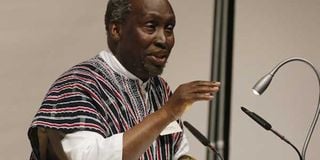Ngugi is not the African best bet for Nobel Prize

Ngugi wa Thiong'o speaks at the University of Bayreuth on May 5, 2014. The 1938-born writer is one of the most respected African intellectuals. He is best known for his criticism of Western imperialism and his activism in support of African languages. PHOTO | COURTESY | PETER KOLB
What you need to know:
- Being the old-fashioned kind of critic, I consider my work to be to talk about the strengths and weaknesses of books, regardless of who wrote them.
- These are the most accomplished authors on the continent today, with Damon Galgut, Chris Abani, and Chimamanda Ngozi Adichie likely to be our new contenders after we’re done whining that the West is not recognising Ngugi on our behalf.
- The 1938-born writer is one of the most respected African intellectuals. He is best known for his criticism of Western imperialism and his activism in support of African languages.
You might be surprised to learn that there are Kenyans who celebrate every time Ngugi wa Thiong’o misses the Nobel Prize for Literature.
In these anti-Ngugi circles, I’m put among those to be jeered ostensibly because I have vigorously “really pushed” for the Kenyan author to win the coveted prize.
Being the old-fashioned kind of critic, I consider my work to be to talk about the strengths and weaknesses of books, regardless of who wrote them.
I’ll criticise the weaknesses of anybody — the novice and the veteran, the unknown and the venerated, the living and the dead.
Unlike some young scholars who have perfected the art of boot-licking the high and mighty in the academy and to praise people they haven’t read thoroughly, I am neither Ngugi’s ndungata (servant) nor his garagaria (minion). I don’t aspire to be anybody’s mtumwa (slave).
Even if I were the hero-worshiping type, to me, Ngugi would not be the African front-runner for the Nobel Prize.
I would propose the Somali author Nuruddin Farah or the Algerian woman writer Assia Djebar.
PROSPECTIVE WINNER
These are the most accomplished authors on the continent today, with Damon Galgut, Chris Abani, and Chimamanda Ngozi Adichie likely to be our new contenders after we’re done whining that the West is not recognising Ngugi on our behalf.
Of course, when gambling at Ladbrokes, the British betting firm that often speculates about Ngugi winning, I’d put some money on the Moroccan Tahar Ben Jelloun, whose ideology tallies with that of most of the non-European literature Nobel laureates.
Among Nobel speculators, Ngugi has always ranked above my Farah and Djebar, while Jelloun rarely features on the lists of possible winners.
In 2010, Ladbrokes tipped Ngugi as a prospective winner. When the prize was announced that year, it went to the Peruvian author Mario Vargas Llosa, who, like Ngugi, is overtly political in his writing but leans less to the left than Ngugi.
This year the Kenyan was tipped to win as well. Ladbrokes spokesman Alex Donohue put Ngugi at the top, ahead of the Japanese Haruki Murakami. The prize went to the Frenchman Patrick Modiano.
The prize is worth an eight million Swedish kronor (about Sh100 million) cash prize. The winner also witnesses a tremendous boost in sales.
Since his debut in 1968, the 1945-born Modiano has penned close to 30 books, not to mention three screen plays and several film adaptations of his novels.
Whether Ngugi, the author of eight novels, ever wins the award or not, is beside the point.
The 1938-born writer is one of the most respected African intellectuals. He is best known for his criticism of Western imperialism and his activism in support of African languages.
Ngugi is the only possible bet from Kenya, a country that has lagged behind in literary production mostly because we do not read our authors’ works. We prefer to throng city streets to welcome our idle politicians from the airport.
Most of the people quick to dismiss Ngugi have not read his work.
A myth circulates in Kenya that his works are available only in his mother tongue Gikuyu. However, it is only one children’s book, Njamba Nene na Cibu King’aang’i (Njamba Nene and the Cruel Chief King’aang’i) that is not available in English. The rest are, some even in Kiswahili.
RADICAL POLITICS
One honour better than the Nobel that we can give Ngugi is to read him thoroughly.
This is not in order to praise him or drum up support for him to win the Nobel Prize. Rather, reading him would enable us to dismiss him, if we have to, from a point of knowledge.
Literary art thrives on criticism. It’s better for a writer to be dismissed loudly than to be admired silently.
Indeed, a preface in the Gikuyu version of Ngugi’s Devil on the Cross [Caitani Mutharaba-ini] that was not included in the English and Kiswahili translations encourages its readers to shred the novel into pieces if they find it wanting, regardless of the fact that it was written in difficult circumstances on prison toilet paper when Ngugi was in detention in the late 1970s.
Ngugi belongs in the league of artists who have won the Nobel (e.g. Wole Soyinka, Naguib Mahfouz, and Nadine Gordimer).
Unfortunately, except James Ogude, Ndigirigi Gichingiri, and Simon Gikandi, there are no serious Kenyan critics to explain Ngugi’s works to the world.
In the 1980s, Kenyan universities were ordered to rid their campuses of Ngugi’s radical politics.
But even today, these so-called universities are more interested in putting up tall buildings (named in honour of Kenya’s most despicable crony capitalists) than in encouraging politically engaged intellectual excellence.
For example, where on Kenyan campuses is the Ngugi wa Thiong’o Centre for the Study of African Languages?
Probably the universities are waiting for Ngugi to be honoured by Europeans first before they can recognise him for the great thinker he is.




